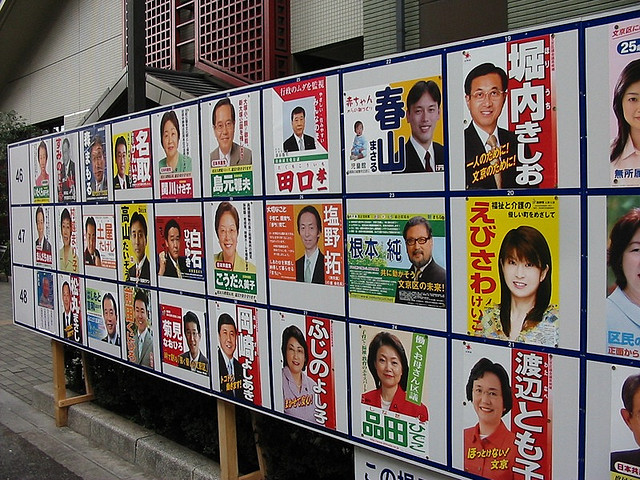
At first glance, it appears that the recent election results in Japan and the early policy pronouncements of the Abe government indicate that Japan has shifted significantly to the right and that this will increase strategic tensions in Northeast Asia. The evidence seems clear and plentiful:
- The Liberal Democratic Party of Japan’s return to office after only one term in opposition via a thumping electoral victory (LDP 294 seats out of 480 up from 119 in 2009)
- The electoral humbling of the nominally left-leaning Democratic Party of Japan (DPJ 57 seats, down from 308 in 2009)
- The rise from nowhere of the Japan Restoration Party co-led by arch-nationalist Shintaro Ishihara (JRP 54 seats in its inaugural election)
- The return of the nationalist Shinzo Abe as prime minister
- The prevalence of nationalist revisionists in his cabinet
- Abe’s commitment to reverse Japan’s decade-long decline in defence spending
- Abe’s call to amend the Japanese ‘peace’ constitution
- The escalation of the Japan-China territorial dispute over the Japanese administered Senkaku islands from simmering to bubbling
The South Korean and Chinese media have certainly read the evidence this way, while authoritative voices in Australia have jumped in early to chastise the new Abe government along these lines. Reading the evidence this way is useful for China and Korea as it puts the onus of blame on the new Japanese government for any further increase in regional tensions and revives the spectre of Japanese ‘militarism’ in the minds of their own people.
For the media and political observers more generally it reaffirms the importance of elections (or in the case of dictatorships, new leadership generations) and plays well into long-running storylines about Japan. The reduction in the number of foreign correspondents in Japan and professional Japan watchers more generally, including in Australia—in this Asian Century—further encourages analysis that falls back on conventional wisdoms and external views of Japan.
The view that emerges from this approach is wrong in timing, causality and effect. The most significant changes to Japanese foreign and security policy took place under the previous DPJ government during the prime ministerships of Naoto Kan (a founding DPJ member) and Yoshihiko Noda (previously from the LDP). The 2010 National Defence Policy Guidelines and the accompanying expert panel report commissioned by the DPJ signify the most important shift in Japanese security policy in decades. They identify the greatest threat to Japan as emanating from China and the defence of remote and outlying islands as the key focus of Japanese defence planning.
As a result of this shift, the DPJ government lifted elements of the long-standing Japanese ban on arms exports and committed to doubling its Aegis capable naval assets, increasing its submarine fleet, shifting naval and air assets to southern Japan and reducing the number of tanks. It was also the DPJ government that pressed Washington to publicly reiterate that the Senkakus are covered by the US–Japan security treaty. Abe’s calls for an increase in defence spending and Constitutional revision and his strong line on the Senkaku issue are consistent with these changes.
The main cause of this shift in thinking within the DPJ government between the cooperative, pro-China, anti-US alliance days of Prime Minister Hayotama and his successors can’t be explained by the rise of Japanese revisionist nationalism. Rather the causes were (and are) the growing concerns across the Japanese political spectrum and populace over the secular rise of China and relative decline of Japan, China’s growing assertiveness in the East China Sea, the growing number of incidents between China and Japan in Japan’s southern waters and China’s steadfast backing of its belligerent ally, North Korea. The 2010 collision between a Japanese coast guard vessel and a Chinese fishing vessel in the disputed waters around the Senkakus and the political fall-out from this in Japan was a much more important political event in this context than the LDP’s recent landslide victory.
The timing and causality of the rightward shift in Japan mean that present criticisms of the Abe government as the cause of new tensions in the region and calls for Japan to moderate its stance on the Senkaku issue and approach to China in particular get what is happening in Japan wrong. They are more likely to strengthen the nationalist revisionist cause by increasing Japan’s concern that it’s being isolated and that Japan is being misrepresented by the outside world that increasingly sees Japan through the distorted lens of its closest and largest neighbour and rival. Understanding Japan’s non-partisan concerns with its deteriorating external environment and position in East Asia and the role that Chinese nationalist actions play in these is crucial to getting Japan right. Getting this right is crucial to being able to talk with the present government effectively about how the voices of historical revisionism empowered by this shift and the re-election of the LDP simply add to Japan’s worsening strategic environment and position.
Malcolm Cook is dean of the School of International Studies, Flinders University and non-resident fellow at the Lowy Institute for International Policy. Image courtesy of Flickr user macguys.

